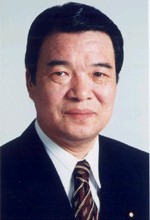Mineichi Iwanaga
Mineichi Iwanaga was a notable figure in the history of Japanese military, particularly recognized for his contributions during the Second Sino-Japanese War and World War II. His career and actions provide insight into the complexities of Japan's military strategies and the broader implications of its wartime conduct.
Early Life and Career[edit | edit source]
Mineichi Iwanaga was born in the late 19th or early 20th century in Japan. Details about his early life, including his date of birth and education, are scarce. Like many of his contemporaries, Iwanaga pursued a career in the military, rising through the ranks of the Imperial Japanese Army.
Military Service[edit | edit source]
Iwanaga's military career was marked by his involvement in significant conflicts that shaped East Asia in the first half of the 20th century. His service in the Second Sino-Japanese War (1937-1945) was particularly notable. This conflict, which merged into the broader context of World War II, saw Japan expanding its influence and control over China, leading to widespread atrocities and suffering.
During World War II, Iwanaga held various positions, contributing to Japan's military efforts. His roles and responsibilities during the war, including any specific battles or campaigns he participated in, would have been influenced by the strategic priorities of the Imperial Japanese Army and the shifting dynamics of the global conflict.
Post-War Period[edit | edit source]
The end of World War II marked a significant turning point in Japan's history, with the country undergoing profound changes. The role of military figures like Iwanaga during the post-war period is an area of interest, particularly in understanding how they adapted to Japan's defeat, the occupation by Allied forces, and the subsequent transition to peace.
Legacy[edit | edit source]
Mineichi Iwanaga's legacy is intertwined with the broader narrative of Japan's military history during a tumultuous era. His contributions, along with those of his peers, continue to be studied for their impact on the course of the Second Sino-Japanese War and World War II. The complexities of Japan's military actions, including the ethical and moral considerations, remain subjects of discussion and analysis.
See Also[edit | edit source]
Search WikiMD
Ad.Tired of being Overweight? Try W8MD's physician weight loss program.
Semaglutide (Ozempic / Wegovy and Tirzepatide (Mounjaro / Zepbound) available.
Advertise on WikiMD
|
WikiMD's Wellness Encyclopedia |
| Let Food Be Thy Medicine Medicine Thy Food - Hippocrates |
Translate this page: - East Asian
中文,
日本,
한국어,
South Asian
हिन्दी,
தமிழ்,
తెలుగు,
Urdu,
ಕನ್ನಡ,
Southeast Asian
Indonesian,
Vietnamese,
Thai,
မြန်မာဘာသာ,
বাংলা
European
español,
Deutsch,
français,
Greek,
português do Brasil,
polski,
română,
русский,
Nederlands,
norsk,
svenska,
suomi,
Italian
Middle Eastern & African
عربى,
Turkish,
Persian,
Hebrew,
Afrikaans,
isiZulu,
Kiswahili,
Other
Bulgarian,
Hungarian,
Czech,
Swedish,
മലയാളം,
मराठी,
ਪੰਜਾਬੀ,
ગુજરાતી,
Portuguese,
Ukrainian
Medical Disclaimer: WikiMD is not a substitute for professional medical advice. The information on WikiMD is provided as an information resource only, may be incorrect, outdated or misleading, and is not to be used or relied on for any diagnostic or treatment purposes. Please consult your health care provider before making any healthcare decisions or for guidance about a specific medical condition. WikiMD expressly disclaims responsibility, and shall have no liability, for any damages, loss, injury, or liability whatsoever suffered as a result of your reliance on the information contained in this site. By visiting this site you agree to the foregoing terms and conditions, which may from time to time be changed or supplemented by WikiMD. If you do not agree to the foregoing terms and conditions, you should not enter or use this site. See full disclaimer.
Credits:Most images are courtesy of Wikimedia commons, and templates Wikipedia, licensed under CC BY SA or similar.
Contributors: Prab R. Tumpati, MD

